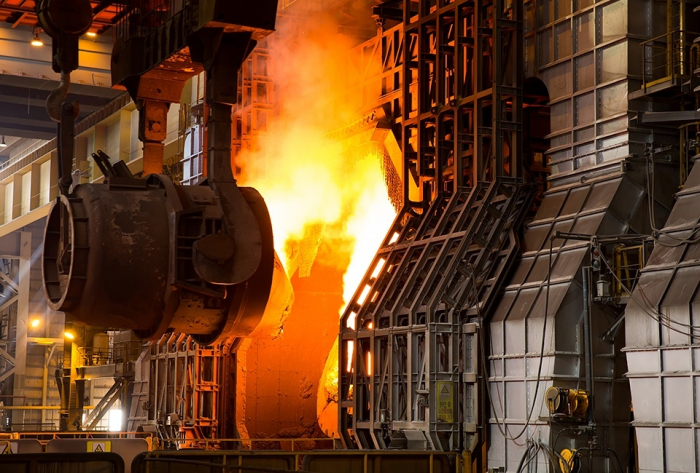Steel
Korea steelmakers see risks from carbon, supply issues
Global moves to cut carbon emissions and worldwide supply chain disruptions are likely to cut steelmakers’ H2 earnings
By Apr 22, 2022 (Gmt+09:00)
2
Min read
Most Read
LG Chem to sell water filter business to Glenwood PE for $692 million


Kyobo Life poised to buy Japan’s SBI Group-owned savings bank


KT&G eyes overseas M&A after rejecting activist fund's offer


StockX in merger talks with Naver’s online reseller Kream


Mirae Asset to be named Korea Post’s core real estate fund operator



The South Korean steel industry’s top executives are anticipating a perfect storm amid the global push for carbon neutrality and supply chain disruptions around the world.
Local steelmakers have been enjoying strong earnings thanks to the global supercycle so far, but those issues are likely to hurt their profits this year, those executives said.
“Various risks such as the carbon neutrality and the global supply chain disruption are piling up,” Jeong Tak, the president of POSCO Co., the world’s sixth-largest steelmaker, told The Korea Economic Daily on Thursday on the sidelines of an annual industry meeting at the National Assembly.
Hyundai Steel Co.’s President CEO Ahn Dong-il also stressed that preparation for carbon neutrality is the company’s top priority this year.
SeAH Steel Corp. plans to actively use its electric arc furnace, which emits about a quarter of the carbon of a blast furnace to produce steel, its CEO Howard Lee said.
The steel industry is the sector that emits greenhouse gas most along with the petrochemical and cement industries. POSCO was the top emitter last year, uttering 75.7 million tons of carbon, followed by Hyundai Steel with 28.6 million tons, according to the Ministry of Environment.
Last month, South Korea adopted a stricter emission goal, under which Korean companies are required to reduce greenhouse gases by 40% from 2018 levels by 2030. That means a cut in the allocated amount of carbon emissions for each company, forcing high emitters to buy carbon credits in trading markets.
CLOUDY H2
The global steel supercycle is expected to last until the first half, but the global moves to cut carbon emissions and the world’s supply chain disruption are likely to undermine their earnings, those executives said.
“We are really worried about earnings in the second half, given many variables such as the carbon neutrality and the supply chain disruption,” said Dongkuk Steel Mill Co. CEO Kim Yeon-kuk.
The global supply chain disruption intensified on the war in Ukraine and rising commodity prices, he added.
The global steel demand was expected to dip 0.4% this year on the tension between the US and China, as well as environmental regulations, after rising 2.7% last year, according to the local steel industry. Costs of iron ore, a key raw material, soared but steelmakers could not fully reflect the jump in product prices, hurting the industry’s profitability.
Iron ore prices jumped about 21% to $152.06 per ton as of April 18 from $125.18 a ton in January.
Dongkuk’s Kim reportedly urged his staff to swiftly deal with the volatile commodity market.
South Korea’s steelmakers are unlikely to overcome an upcoming crisis stemming from the issues with the existing management strategies, those executives said.
Hyundai’s Ahn said the industry needs to seek survival and prepare for the future by getting out of a rut.
“In a rapidly changing environment, yesterday’s method cannot be applied today and today’s solution cannot be effective tomorrow,” he said.
Write to Jeong Min Nam at peux@hankyung.com
Jongwoo Cheon edited this article.
More to Read
-
 EarningsPOSCO returns from pandemic blues with record quarterly profit
EarningsPOSCO returns from pandemic blues with record quarterly profitApr 15, 2022 (Gmt+09:00)
2 Min read -
 SteelKorea Dongkuk targets record profit on Brazil CSP’s brisk earnings
SteelKorea Dongkuk targets record profit on Brazil CSP’s brisk earningsApr 11, 2022 (Gmt+09:00)
3 Min read -

-
 Carbon neutralityPOSCO to build mini mills for carbon neutrality
Carbon neutralityPOSCO to build mini mills for carbon neutralityDec 20, 2021 (Gmt+09:00)
5 Min read
Comment 0
LOG IN


